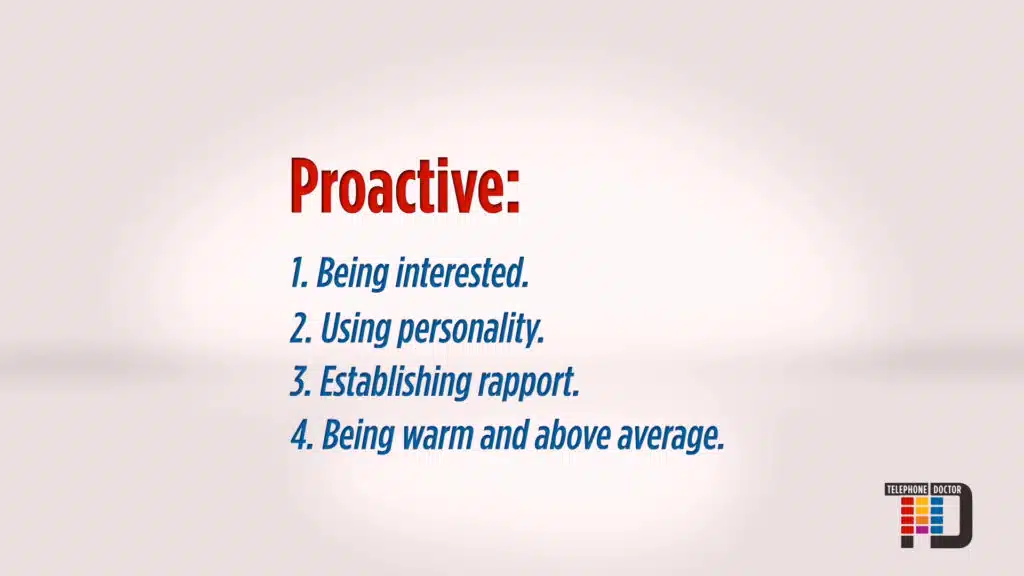Up-selling, cross selling, suggestive selling – regardless of what you call it, if you’ve ever been a customer somewhere or worked in the customer service or sales industry, you’ll be familiar with this practice. Depending on your experience with this technique, you may be more or less in favor of its use. The reality is that while up-selling can be perceived as pushy or annoying by a customer when done poorly, a basic component of effective customer service is to offer your customers additional choices. So, employees should learn and use the right technique to avoid offending customers while still letting them know the range of options your organization can offer them.
The top salespeople in your team will be those who deliver proactive customer service, and up-selling is one element of this type of service. However, we prefer to use the term “soft question” selling. This is because our suggested technique uses a range of gentle questions to find out if your customer has a need for other products or services from your company that they might not have heard about.
These soft questions can be used to promote a free service, inform the customer of a special sale, or to suggest something to the customer that is relevant to what they’re already buying or ordering which they might find particularly useful. When used in this way, the customer is less likely to feel as though an unnecessary purchase or upcharge is being pushed on them. Rather, they’ll likely feel as though you paid attention to the need they described when making their current purchase or order and are being helpful and responsive. It’s a win-win situation when the customer feels valued, and you make an extra sale or earn the customer’s loyalty.
How to use soft question selling
The key to soft question selling is having a legitimate reason for suggesting the upgrade or extra item or service to your customer. This requires customer service representatives and salespeople to be proactive – noting down needs that the customer describes, looking up past purchases or orders from the customer and thinking of ways to make things more convenient for the customer.
Think of it this way: by using soft question selling, you’re trying to be genuinely helpful to the customer by offering them choices. The customer can say ‘No, thank you’ if they’re not interested, but denying them a choice means they don’t get the chance to consider if your suggestion will be helpful for them. By adopting this attitude, your questions and suggestions will likely not feel pushy and annoying like typical upselling might.
Soft selling question prompts
There are five key prompts around which you can base your soft selling questions. The first is: “Are you aware…?” This prompt is often used to inform the customer of a service that might make things more convenient for them. For instance, you might say:
- Are you aware of our free overnight shipping policy if we make a mistake on your order?
- Are you aware of our free online bill payment service?
- Are you aware of our VIP plan? It allows business travelers to upgrade to the concierge level for only $50 extra per day.
The next prompt is: “I noticed…” This is useful when you have observed a buying pattern or need of the customer, and you want to suggest an addition to meet their need or to remind them of what they’ve bought previously. For instance, you could say:
- I noticed that you bought socks the last time you ordered shoes. We have a buy-two-get-one-free sale on socks. Do you need any more?
- I noticed that you were talking about how your sink occasionally leaks. We have a special right now where our technicians can do a thorough check of your plumbing for 40% off the usual rate. Would you like us to go ahead and schedule that for you?
Another way to make a customer aware of a sale they might be interested in or a product that is related to what they’re buying is to use the prompt “Have you seen…?” This is a gentle way of showing the customer something else they might want to buy. For instance, you might say:
- Have you seen that we also have a matching jacket for that dress? It’s on sale this week.
- Have you seen that we also offer travel insurance? This would protect the flights that you’re booking through us in case anything happens.
Similarly, you can also use the prompt “Did you know…?” to gently point customers towards additional add-ons that might be useful. For instance, you could say:
- Did you know that we offer an identity protection plan on checking accounts? It’s only $2.95 per month.
- Did you know that we’re able to schedule your follow-up appointment now so you don’t have to worry about calling back later?
The final useful prompt that we suggest is: “Would you be interested…?” This can be used when you’re aiming to be respectful but slightly more direct in finding out if a customer wishes to make an additional purchase or hear about further services. For instance, you might say:
- Would you be interested in seeing our full range of long-sleeve shirts?
- Would you be interested in speaking to our pest-prevention specialist to find out more about those services?
The biggest benefit of these soft questions is that they’re seldom rejected. Those who need the services will appreciate the suggestion and those who don’t will be similarly gentle and respectful in response.
By using these soft question selling prompts, you’ll simultaneously improve your sales while earning customer loyalty. To learn more about encouraging a proactive customer service approach, contact ServiceSkills today.












